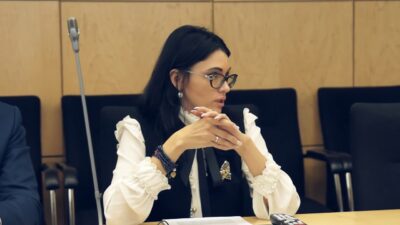MINSK — A physician and a journalist in Belarus have gone on trial for allegedly disclosing information about a protester killed during a crackdown on demonstrations against authoritarian ruler Alyaksandr Lukashenka.
The Moscow district court in Minsk started the trial of Artsyom Sarokin and Katsyaryna Barysevich on February 19 with a decision to hold the process behind closed doors claiming “personal medical data” would be involved in the case.
The decision to bar the public sparked protests by dozens of supporters who were at the court.
Journalist Barysevich, from the online newspaper Tut.by, and Sarokin, a doctor with the Minsk ambulance service, were arrested on November 19 after Barysevich cited Sarokin in an article she wrote about Raman Bandarenka, who had died several days earlier from injuries he sustained in a vicious beating by a group of masked assailants. Activists had said the attackers were affiliated with the authorities.
Belarusian officials have claimed that Bandarenka’s attackers had nothing to do with the authorities or riot police, adding that Bandarenka was drunk when he was attacked.
Barysevich wrote that no alcohol had been found in Bandarenka’s blood, information she obtained from Sarokin, whose ambulance team provided Bandarenka with medical attention and took samples for tests right after he was found severely beaten.
The two have been charged with disclosing medical data. Barysevich is additionally charged with instigating a crime by pushing Sarokin to share the medical data. If found guilty, the two could face up to three years in prison.
In late November, Amnesty International recognized Sarokin and Barysevich as prisoners of conscience and demanded their immediate release.
Bandarenka is one of several people to have been killed during the protests demanding Lukashenka’s resignation after he was announced as the winner in an August presidential election.
Outrage over what was seen by both opposition forces and the general public as a rigged vote to hand Lukashenka a sixth term in office brought tens of thousands onto the streets.
Security officials have cracked down hard on the demonstrators, arresting thousands, including dozens of journalists who covered the rallies, and pushing most of the top opposition figures out of the country.
Some rights organizations say there is credible evidence of torture being used by security officials against some of those detained.
Lukashenka, who has run the country since 1994, has denied any wrongdoing with regard to the election and refuses to negotiate with the opposition on stepping down and holding new elections.On February 18, Amnesty International published a document about four Belarusian artists and performers — Vola Semchanka, Illya Yasinski, Andrus Tokidang, and Alyaksey Sanchuk, who have continued to perform and have challenged Lukashenka and his government despite being arrested and beaten.
“Today, they have also become symbols of courage and solidarity, as hundreds of Belarusian artists are being targeted by the government for their artistic expression of dissenting views. Some have been fired from their jobs, others have been detained and tortured, yet others are languishing behind bars awaiting trial and facing long prison sentences,” Amnesty said.
The European Union, United States, Canada, and other countries have refused to recognize Lukashenka, 66, as the legitimate leader of Belarus and have slapped him and senior Belarusian officials with sanctions in response to the “falsification” of the vote and postelection crackdown.



